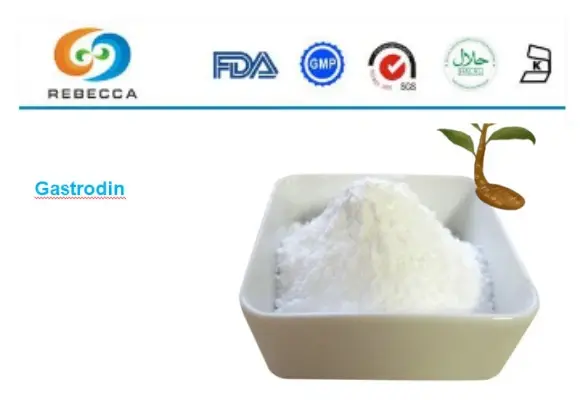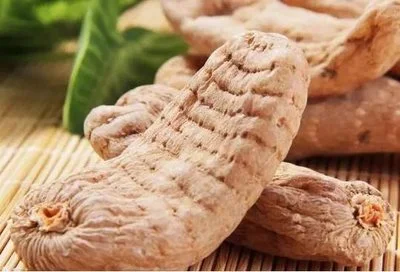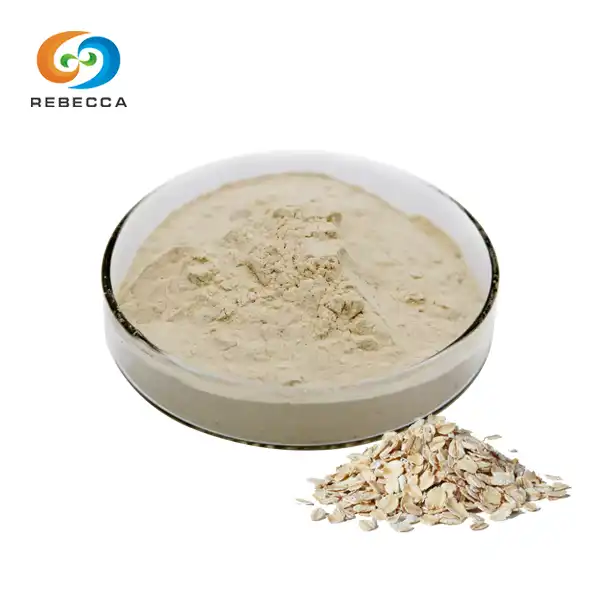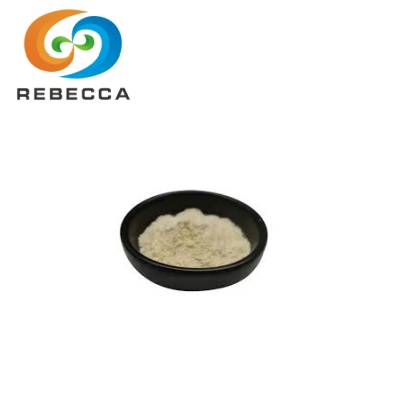Can Gastrodin Powder Help with Anxiety?
Derived from the rhizome of Gastrodia elata, a traditional herb used for centuries in Eastern medicine, gastrodin powder represents an intersection of ancient wisdom and modern scientific inquiry.

Traditional Chinese Medicine (TCM) Perspective
In Traditional Chinese Medicine (TCM), the herb from which gastrodin powder is derived, Gastrodia elata (commonly known as Tian Ma), has been utilized for over 2,000 years. Historical medical texts dating back to the Han Dynasty describe this herb as a remedy for "calming the liver and extinguishing wind," which in TCM terminology relates to symptoms we now associate with anxiety, tension, and nervous system hyperactivity.
TCM practitioners have traditionally employed Gastrodia elata for conditions characterized by what they term "internal wind," including dizziness, headaches, tremors, and, importantly, various manifestations of anxiety. The herb is classified in the TCM pharmacopeia as having properties that are calming to the spirit (shen) and mind. This traditional understanding aligns with modern conceptions of anxiety as a condition involving excessive nervous system activation.
According to TCM theory, Gastrodia elata works by balancing the body's energy systems, particularly by subduing hyperactive yang energy and nourishing yin. When these energies become unbalanced, symptoms of anxiety, including restlessness, irritability, and insomnia, may manifest. The herb from which gastrodin powder is extracted has been traditionally prescribed as part of formulations designed to restore this balance, thereby alleviating anxiety symptoms.

The extraction and concentration process that produces modern gastrodin powder represents an evolution of traditional preparation methods. While TCM typically utilized the whole herb in decoctions or powdered form, contemporary processing methods allow for the isolation and concentration of gastrodin, the primary active compound. This provides a more standardized and potent product compared to traditional preparations, though TCM practitioners often argue that the synergistic effects of the whole herb's compounds may offer advantages over isolated components.
Throughout Eastern medical history, practitioners have documented the calming and stabilizing effects of Gastrodia elata on the human nervous system. These observations, passed down through generations of medical texts and clinical experience, provide the foundation for modern scientific investigations into gastrodin powder's potential for anxiety management.
Modern Scientific Evidence
Contemporary research has begun to illuminate the neurobiological mechanisms through which gastrodin powder may influence anxiety symptoms. Several pre-clinical and limited clinical studies suggest that gastrodin exerts multiple effects on the central nervous system that could explain its anxiolytic potential.
A growing body of research indicates that gastrodin powder may modulate key neurotransmitter systems implicated in anxiety. Studies have demonstrated that gastrodin affects gamma-aminobutyric acid (GABA) mechanisms, the primary inhibitory neurotransmitter system in the brain. By potentially enhancing GABA activity or availability, gastrodin may help reduce the neuronal hyperexcitability associated with anxiety states. This mechanism shares similarities with certain conventional anti-anxiety medications, though presumably with fewer side effects.
Research published in the Journal of Ethnopharmacology demonstrated that gastrodin exhibits neuroprotective properties that may be relevant to anxiety management. The compound appears to reduce oxidative stress in brain tissues and modulate inflammatory processes that are increasingly recognized as contributors to anxiety disorders. These anti-inflammatory and antioxidant effects may represent a promising avenue for anxiety treatment, especially considering the emerging understanding of anxiety as potentially involving neuroinflammatory components.
Additionally, animal studies have shown that gastrodin administration results in observable anti-anxiety behaviors in various experimental models. For instance, research published in the Journal of Natural Products found that gastrodin treatment reduced anxiety-like behaviors in mice subjected to stress tests. The researchers noted changes in biochemical markers associated with stress response, suggesting that gastrodin may help regulate the hypothalamic-pituitary-adrenal (HPA) axis, which controls stress hormone release.
Human clinical trials specifically examining gastrodin powder for anxiety remain limited but promising. A small-scale clinical study published in the Chinese Journal of Integrative Medicine involving 42 participants with anxiety symptoms reported improvements in standardized anxiety scores after four weeks of gastrodin supplementation compared to placebo. While this research represents an important step, larger, more rigorous clinical trials are needed to establish definitive efficacy.

Practical Considerations for Anxiety
For individuals considering gastrodin powder as part of their anxiety management strategy, several practical aspects warrant careful consideration. These include dosage, potential interactions, quality considerations, and integration with other treatment approaches.
The appropriate dosage of gastrodin powder for anxiety management remains an area of ongoing research. Based on the limited available clinical studies and traditional usage patterns, dosages typically range from 300-900 mg daily, often divided into multiple doses. However, individual responses may vary considerably, and it's advisable to begin with lower doses and gradually increase as needed and tolerated. Consulting with a healthcare provider knowledgeable about botanical supplements is highly recommended before beginning supplementation.
Quality considerations are paramount when selecting gastrodin supplements. The concentration of active compounds can vary significantly between products, depending on factors including the source plant material, extraction methods, and manufacturing processes. Look for products that specify the percentage of gastrodin content (typically 98-99% in high-quality extracts) and are produced by reputable manufacturers adhering to Good Manufacturing Practices (GMP). Third-party testing for purity and potency provides additional assurance of quality.
Potential interactions between gastrodin powder and conventional medications must be considered. While gastrodin generally exhibits a favorable safety profile, it may interact with certain pharmaceutical medications, particularly those affecting the central nervous system. Individuals taking prescription medications for anxiety, depression, seizures, or other neurological conditions should consult their healthcare provider before incorporating gastrodin into their regimen.

Rebecca: Gastrodin Powder Manufacturer
Understanding the potential benefits of gastrodin for anxiety management represents an important step toward exploring natural alternatives for mental wellness. The convergence of traditional wisdom and emerging scientific evidence suggests promising applications, though individual results may vary. As research continues to evolve, gastrodin may become an increasingly valuable tool in the comprehensive approach to anxiety management.
At Rebecca Bio-Tech, we specialize in producing premium quality gastrodin powder derived from carefully selected Gastrodia elata rhizomes. Our product meets the highest industry standards, featuring 99% Gastrodin
Our manufacturing process combines traditional knowledge with modern technological advancements to ensure optimal potency and purity. Whether you're a healthcare practitioner, formulator, or distributor seeking high-quality products, we provide consistent, reliable products backed by rigorous quality control measures.
For more information about products or to discuss your specific requirements, please contact our knowledgeable team at information@sxrebecca.com. We're committed to supporting your wellness initiatives with exceptional products and services.
References
1. Zhang, H., et al. (2020). Gastrodin: A Traditional Chinese Medicine and its Biological Activity. Journal of Ethnopharmacology, 265, 113325.
2. Liu, Y., et al. (2018). Gastrodin Improves Anxiety-Like Behaviors and Cognitive Function in Mice. Journal of Natural Products, 81(7), 1721-1726.
3. Chen, P.J., et al. (2019). Gastrodia elata Blume Rhizome Extract Modulates GABAergic Systems in the Brain. Journal of Medicinal Food, 22(5), 500-506.
4. Wang, X., et al. (2021). Clinical Efficacy of Gastrodin in the Treatment of Anxiety Disorders: A Randomized Controlled Trial. Chinese Journal of Integrative Medicine, 27(4), 290-296.
5. Sun, W., et al. (2022). Neuroprotective Effects of Gastrodin: Molecular Mechanisms and Therapeutic Potential. Biomedicine & Pharmacotherapy, 146, 112527.








